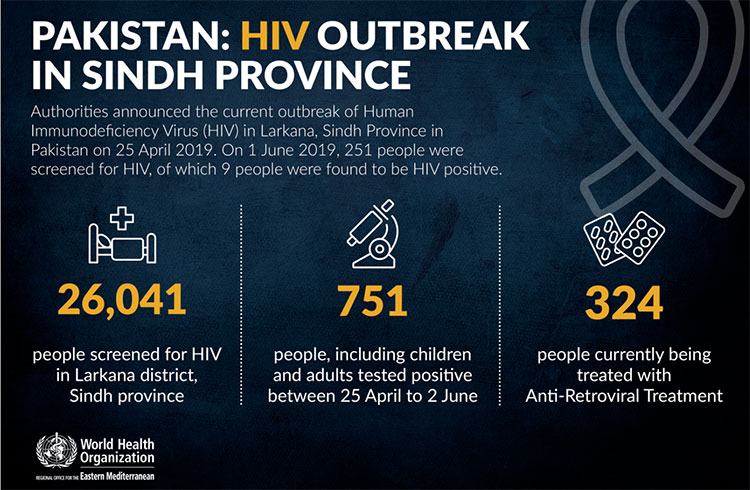パキスタンのHIV感染アウトブレークに関する追加情報です。世界保健機関(WHO)も公式サイトで6月13日付け現地報告を掲載しています。

6月2日までの集計でアウトブレークの現場であるシンド州では2万6041人がHIVスクリーニング検査を受け、このうち751人がHIV陽性と判明しました。パキスタン国内の現在の抗レトロウイルス薬の備蓄では、その全員に直ちに抗レトロウイルス治療(ART)を開始することはできず、6月2日時点でARTを受けている人は陽性と診断された751人中324人(43%)ということです。
今回のアウトブレークでは子供の感染が際立って多いのですが、治療を受けている子供は231人にとどまっています。また、現状の在庫では、子供240人分の治療に7月15日までしか対応できず、『数多くの子供が検査でHIV陽性と判明していながら治療を受けられない状態で残されている』ということです。
WHOはこの緊急事態に対応するため、Donor Updateという冊子を作成し、寄付の要請も行っています。
以下の緊急ニーズに対応するためには、105万5000米ドルが必要だということです。
・抗レトロウイルス薬
・迅速検査キット
・重感染症の治療薬
・保健医療施設における感染予防と制御策の強化
・保健医療従事者の確保・研修
・家族・コミュニティに対する心理社会的支援
治療の進歩を踏まえたHIV/エイズ対策を進めるうえでも、社会・保健基盤の強化が必要となることは改めて強調するまでもなく、従来から指摘されてきました。今回のアウトブレークはそれを再確認せざるを得ない事態でもあります。同時にHIV/エイズの流行という現在進行中の現象に対応する過程で得られてきた教訓は、社会・保健基盤の強化を進めるうえでも重要な経験知として活用できるのではないかと思います。
ただし、この点については緊急対応と結び付けて「だから言ったじゃないの」といった話をし始めると誤解を生じることにもなりかねません。機会を改めて考えていくことにしましょう。
WHO公式サイトの6月13日の報告、および世界保健機関(WHO)の国際専門家チームがパキスタ入りした際の報告(5月28日付け)の私家版日本語仮訳を以下に紹介しておきます。
◇
http://www.emro.who.int/pak/pakistan-news/pakistan-hiv-outbreak-in-sindh-province.html
2019年6月13日-パキスタン保健当局は2019年4月25日、シンド州ラルカナ市でヒト免疫不全ウイルス(HIV)のアウトブレークが起きていることを発表した。
2019年6月1日には251人がHIVのスクリーン検査を受け、9人がHIV陽性と分かっている。
アウトブレーク発生以来の合計では2万6041人がHIVのスクリーン検査を受け、751人が陽性だった。
751人の陽性例のうち、パキスタン国内の治療薬備蓄が不足しているため、抗レトロウイルス治療(ART)を開始した人は324人(43%)にとどまっている。現状の備蓄で子供の陽性者240人に必要な治療薬が確保できているのは2019年7月15日までで、すでにこのうちの231人は治療薬を開始している。つまり、現在の備蓄ではあと9人分の治療にしか対応できず、数多くの子供が検査でHIV陽性と判明していながら治療を受けられない状態で残されている。
WHOのHIV治療ガイドラインでは、test-and-treat(検査して治療)戦略が推奨されている。現在のアウトブレークでは、HIVステージの3および4の人が治療の対象となっている。しかし、スクリーニング検査キャンプによっては、必要となる検査キットが利用できないためWHOの推奨基準通りには検査が実施できていないところもある。
アウトブレークの拡大要因については調査を進めている段階だが、安全性が確保されていない輸血や注射器、注射針の再使用などが可能性として考えられる。
Pakistan: HIV outbreak in Sindh province
13 June 2019 - Authorities announced the current outbreak of Human Immunodeficiency Virus (HIV) in Larkana, Sindh Province in Pakistan on 25 April 2019.
On 1 June 2019, 251 people were screened for HIV, of which 9 people were found to be HIV positive.
In total, 26,041 people have been screened for HIV since the beginning of the outbreak and 751 people have tested positive for HIV.
Of the 751 positive cases, only 324 (43%) are receiving Anti-Retroviral Treatment (ART) due to insufficient stocks in-country. Current stocks are enough to meet the needs of 240 children until 15 July 2019, of which 231 are already receiving treatment. This means that only 9 more children can be enrolled for treatment using available stocks, leaving many other children who have tested positive without treatment.
WHO guidelines on HIV treatment recommend a test-and-treat strategy. In this current outbreak, people with HIV stage III and IV are the targets for treatment. However, in some screening camps, WHO-recommended standards for testing are not being implemented due to unavailability of the recommended test kits.
Possible drivers of the outbreak seem to indicate unsafe practices of blood transfusion and re-use of injection needles and syringes, although this is being further investigated.
◇
WHOがパキスタンのシンド州におけるHIVアウトブレークへの対応を支援
2019年5月28日 イスラマバード- パキスタン国家保健サービス省の要請を受け、シンド州ラルカナ市で発生しているHIVアウトブレークに対応する世界保健機関(WHO)の国際専門家チームがパキスタに到着した。
アウトブレークが最初に報告にされたのは2019年4月25日で、大規模なHIVスクリーニング検査は4月28日にスタートしている。5月8日には保健従事者の追加配置を行い、検査プログラムを拡大している。検査はいまも続けられている。
これまでに600件を超えるHIV感染症例が確認されている。その多くは子供および若年層で;半数以上が5歳以下で占められている。この事態は極めて重大である。このアウトブレーク以前には、HIV感染が分かり、抗レトロウイルス治療を受けている子供の数はパキスタン全体で1200人強だった。
パキスタン保健当局は5月16日、ラルカナ市の小児向けに新たな抗レトロウイルス治療クリニックを開設した。
WHO主導チームの主な任務は;アウトブレーク発生源の確認とそのコントロール;HIV検査、小児HIV治療、家族へのカウンセリングに関する専門技術の提供;迅速診断検査、成人向け・小児向けの両方の抗レトロウイルス薬、使い捨て注射器・注射針の供給確保などが含まれる。
WHOのミッションには今後、WHOと地球規模感染症に対する警戒と対応ネットワーク(GOAEN)による緊急対応マネージメント、疫学、HIVケア、感染予防とコントロールなどの専門家が含まれることになる。このチームは国家保健サービス省、およびアガ・カーン大学、パキスタン現地疫学調査・臨床検査研修プログラム(FELTP)、UNAIDS、UNICEFなどと緊密な連携のもとで活動にあたる。
WHO supports response to HIV outbreak in Sindh, Pakistan
28 May 2019, Islamabad – An international team of experts from the World Health Organization (WHO) has arrived in Pakistan to support the response to an outbreak of HIV in Larkana in Sindh province, Pakistan, at the request of the Ministry of National Health Services, Regulation and Coordination.
The outbreak was first reported on 25 April 2019, and a major HIV screening programme started on 28 April. It was expanded on 8 May, with additional health workers being deployed. Testing is ongoing.
So far more than 600 HIV cases have been identified. The majority are among children and young people: more than half those affected are children under the age of 5. This poses a particular challenge. Prior to this outbreak, there were just over 1200 children diagnosed with HIV and receiving antiretroviral treatment in the whole of Pakistan.
On 16 May local authorities established a new antiretroviral treatment clinic for children in Larkana.
Key tasks for the WHO-led team will include: ascertaining the source of the outbreak and controlling it; providing technical expertise, particularly in the areas of HIV testing, paediatric HIV treatment and family counselling; and ensuring adequate supplies of rapid diagnostic tests and antiretroviral medicines for both adults and children, as well as single-use needles and syringes.
The WHO mission will include experts in emergency response management, epidemiology, HIV clinical care, and infection prevention and control from WHO as well as the Global Outbreak Alert and Response Network (GOARN). The team will work closely with the Ministry and partners, including the Aga Khan University, Pakistan’s Field Epidemiology & Laboratory Training Program (FELTP), UNAIDS and UNICEF in Larkana.